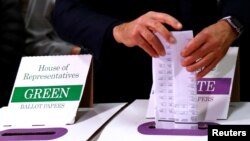Australians may have to wait a few more days to find out who will be in charge of the next government as election results are still too close to call.
The Election Commission says its focus Sunday is on the large number of mail-in, absentee, interstate and early votes yet to be counted. Final results are not expected for several days, with counting to resume Tuesday.
Australia's conservative ruling coalition and opposition are running neck-and-neck so far in vote counting from Saturday's election, and neither side may have the seats to form a majority government.
Australian Prime Minister Malcolm Turnbull said early Sunday he has "every confidence" his coalition had won the national elections and he will be able to form a coalition government.
But, speaking to supporters late Saturday night, opposition leader Bill Shorten sounded optimistic for his party, which currently holds the lead.
Parties need to hold at least 76 seats in the 150-seat House of Representatives to form a majority government.
So far, the center-left opposition Labor Party leads with about 72 seats, while Turnbull's conservative ruling coalition holds about 66 seats — a loss of several seats. Minor parties and independents won five seats, while counting is less clear in another seven seats.
If neither party earns a majority of seats in the House, both Labor and the coalition will be forced to try to forge alliances with independent lawmakers to form a minority government.
Since voting in Australia is compulsory, Australians went to the polls in large numbers Saturday in a close federal election shaken by a number of minor parties, including a candidate from the Greens and other independent parties.
While climate change, immigration and education were key issues of the electoral campaign, the economy has been the determining factor of the outcome.
Britain’s decision to leave the European Union created great anxiety in Australia, and political leaders put economic security at the heart of their election campaigns.











